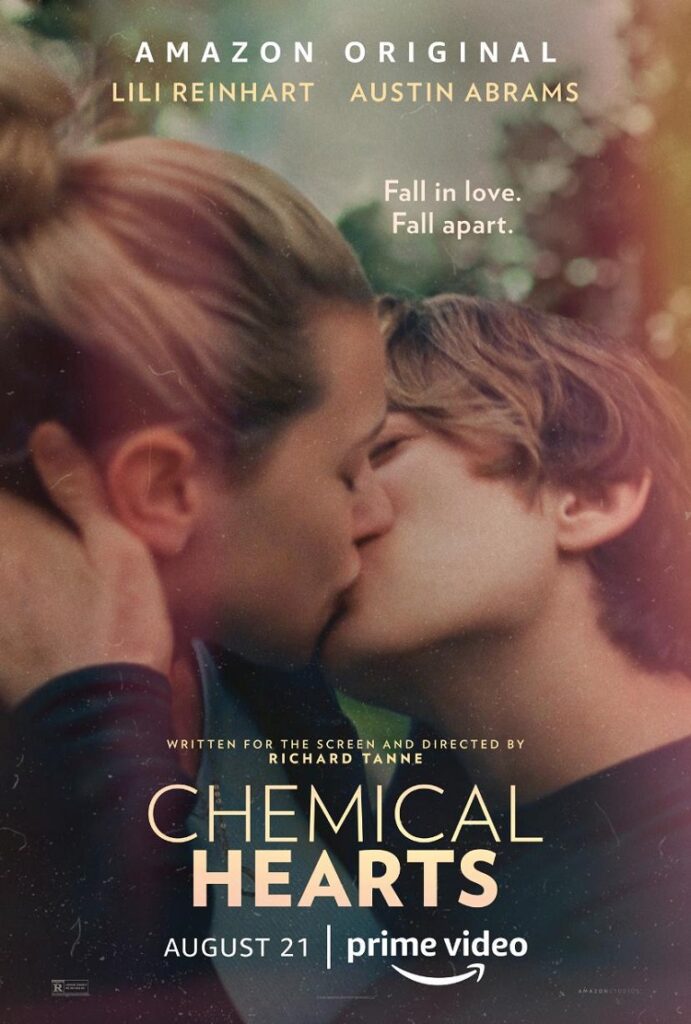
Written by Ram Venkat Srikar
Three minutes into Chemical Hearts, you understand that the film is twisting the teenage-romance genre. It places teenage characters in dramatic situations, in which death and PTSD complicate things, while characters remain teenagers grappling with the difference between objective reality and subjective reality. To call Chemical Hearts pretentious would be untrue, but it could have easily fallen into the trap of flatulent intelligence in the pretext of depth. That doesn’t happen, thanks to the way these characters are set-up; sophisticated yet utterly simple. For instance, when Grace Town (Lili Reinhart) explains her understanding of life and death – drawing an analogy between life and chemistry – to Henry Page (Austin Abrams), the latter’s response is “Are you suicidal?”. A simple conversation (actually, not so simple) as such elucidates that juxtaposing nature of not just two people, but two different ideologies emanating from the lives they have lived so far. Henry’s life has been free of emotional conflict until then, while Grace’s personality has witnessed a curt shift owing to a tragedy and she is now struggling to realign with her pre-tragedy personality. They are not on the same page, basically, and are not exactly in a John Green-ish universe.
The film opens with Henry’s voice-over, which is both earnest and somber, explaining how confusing teenage years can be. He is a person who takes life seriously, has goals and plans. Although he craves to write and aspires to become the editor-in-chief of the high school newspaper, he says he hasn’t found anything worth writing about. On the other hand, Grace, the new girl in school with a mysterious past, chooses not to write, creating an antithesis. Grace’s hesitation to write is deliberate concealment of any form of expression. When Henry and Grace have to serve as co-editors, it’s the amalgamation of two dissimilar people – one expressive and other non-expressive – bound by an expressive medium, writing.
Told from the perspective of Henry, we gradually learn about Grace along with him. I couldn’t help but reminisce Sophie’s Choice, in which Stingo, also a writer, has deep feelings – emotional and sexual – for Sophie, also a woman with a mysterious past. But what sets this movie apart from Sophie’s Choice, Paper Towns, All the Bright Places (also features the female-lead dealing with the death of a loved one), or Tanne’s previous romance, Southside with You, is how Chemical Hearts treats the aesthetical feeling called ‘love’ as a scientific concept. What did I expect from the title? It’s unpretentious, contemplative, and leaves a bittersweet feeling.
Along similar lines, Henry’s grieving sister Sadie, who is going through a breaking relationship, tells that mental pain can metamorphose into physical pain. Although the scene feels purely expository, it reminds us of the film’s world in which Henry and Grace are only a tiny part. While Henry & Grace’s relationship passes through peaks and valleys, his friends La (Kara Young) and Cora’s (Coral Peña) spouting, gleeful relationship reminds that not everything needs to scrutinized with a theoretical perspective, as Grace’s empirical view of life, love, and age complicate things. Just reminding you that it’s a simple, mostly light-hearted movie. Dwelling deep into it, like Grace, is perhaps complicating it. The film, though, is simple as a pimple.
Although there is a cognitive tag appending these people, they are still teenagers. Henry, for instance, thinks twice before clicking ‘send’ while messaging Grace; there is a sense of nervousness before reading her replies; he searches (some may call stalk) her on Instagram, Facebook, and Google; playing “Take Care” by Beach House results in a squabble; an Instagram feed unveils the tragedy that trembled Grace. There are numerous little points – things associated with Gen Z – spread through the story that keeps characters relatable and acting as plot points, invigorating the story.
More than anything, the film’s treatment of teenage and life, in general, left me pondering on the past and present while envisaging where the characters might land up in the future. Like Grace says, adults are just kids with scars, who made it out of teenage alive. Although it sounds too stressful, the film’s not – it’s delightful.